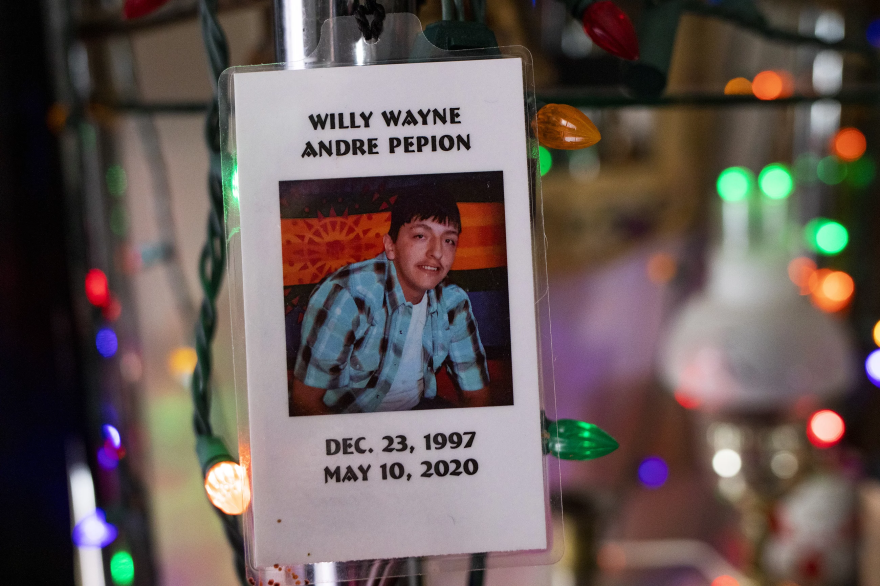A new report commissioned by the Interior Department provides a window into the fatal mistreatment of inmates in its tribal jails. The review comes on the heels of a that found a pattern of neglect and misconduct contributing to at least 19 deaths at tribal detention centers overseen by the Bureau of Indian Affairs since 2016.
When Laura-Su Pepion read the report, it deepened her grief. Her brother Willy died in May 2020 while he was incarcerated at the Blackfeet Correctional Facility in Browning, Montana.
“His death wouldn't have occurred if they took the proper protocols, if they had the proper training,” she said.
Willy Pepion, 22, was arrested for disorderly conduct after he was in a fight. A doctor cleared him for incarceration and he spent 13 hours in a cell. Guards found him dead in that cell, where he had choked on his own vomit. The report for the Interior Department says jail staff didn't take any measures to save Pepion because they lacked personal protection equipment.
“There were so many people that had seen him that night that could have saved his life, but they just didn't care,” Laura-Su Pepion said.
According to the report, jail staff also falsified records to indicate they had regularly monitored Pepion when in fact they had not.
His sister wants more information.
“I’m just trying to understand how a case like my brother’s, which is listed as a homicide, is now federally closed,” she said.
An autopsy determined skull fractures caused Pepion’s death, the report said. The Federal Bureau of Investigation and the Glacier County Sheriff’s Office investigated Pepion’s death, but the only documentation in their report is from Deputy Spotted Eagle of the Glacier County Sheriff’s Office.
“Deputy Spotted Eagle conducted interviews and followed leads that indicate Pepion was struck in the head approximately three times with a shovel during a physical altercation,” before his arrest, the report said.
Laura-Su Pepion is also trying to understand why Darren Cruzan was hired by the Interior Department to review the deaths of her brother and 15 others in tribal jails. Cruzan is the department’s former top cop. His consulting company was awarded an $83,000 contract to study what happened in these incidents despite some of the deaths happening on his watch.
“It’s like somebody being hired to put out the fire that they created with gasoline,” Laura-Su Pepion said.
The Interior Department and the Cruzan Group have defended the contract award.
"I don't have any particular reason to believe that this contract was awarded outside of the regulatory process," Bryan Newland, assistant secretary for Indian Affairs at the Interior Department, .
Many jail staff were untrained in CPR and were often unprepared to handle medical problems, according to the report. It recommended such training for staffers. Brandy Tomhave, an attorney and member of the Choctaw Nation who has directed much of her work to the lack of healthcare in tribal jails, says that recommendation misses a larger problem. She says Native people are regularly denied proper care because the jails fail to staff doctors or nurses.
“There are just guards, and those guards are unfairly expected to medically monitor people, to make clinical decisions for which they are not in any way qualified,” she said.
That was the case with Richard Bennett. In May 2018, he was arrested for possession of an open container and held at the Blackfeet Correctional Facility. The 28-year-old told guards he had chest pains, but his complaint was dismissed. Hours later, he collapsed. Two guards argued about whether he had a pulse. That dispute delayed any lifesaving measures for the next seven minutes, the report said.
Those seven minutes bring to mind one thing for Tom Rodgers: “The nine-minute gap with regard to George Floyd.”
Rodgers, a fellow Blackfeet member with the Rocky Mountain Tribal Leaders Council, says those crucial minutes are eerily familiar. The lives of Floyd, who was Black, and Bennett, who was Native, were devalued by people in the criminal justice system. Neither is here today.
Rodgers says these conditions must change and some lawmakers agree.
“Our facilities and our resources in Indian Country in terms of detention and corrections have to have a level of resource equity and they don't have it now,” Rep. Raúl Grijalva, D-Ariz., told the Mountain West ���ڱ��� Bureau. He chairs the House Natural Resources Committee that oversees the Interior Department.
“The urgency of this equity question has been brought up before and now it has more urgency,” Grijalva said. “And we’re going to exercise oversight.”
Grijalva declined to provide details about what that oversight might entail. But the need for it is not new. Problems in tribal jails . And for Laura-Su Pepion, the urgency comes too late.
“Something like this being fixed, it would just numb the pain a little more than what it is right now,” she said.
The Bureau of Indian Affairs recently announced reforms to its jails. The changes include more training on how to perform in-custody death investigations. But they fail to address larger issues like the need for better healthcare.
A spokesperson from the Interior Department declined to comment for this story.
This story was produced by the Mountain West ���ڱ��� Bureau, a collaboration between Wyoming Public Media, Nevada Public Radio, Boise State Public Radio in Idaho, KUNR in Nevada, the O'Connor Center for the Rocky Mountain West in Montana, KUNC in Colorado, KUNM in New Mexico, with support from affiliate stations across the region. Funding for the Mountain West ���ڱ��� Bureau is provided in part by the .




